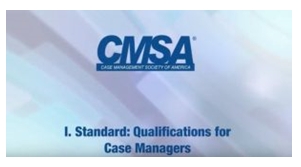 by Eric Bergman, RN, CCM, Vice-Chair CMSA National PPC
Each year, CMSA hosts a "Hill Day" where we organize legislative visits and assist members to educate their congressional representatives on professional case management. This year, it will be on September 13 - 14, 2017. CMSA members from chapters across the nation will join in Washington for the annual event, which will include a preparatory meeting the night before and the next day, canvassing the Hill to support legislation that is important to professional case managers.
For a number of years, Connie Sunderhaus – a former member of CMSA’s Public Policy leadership – has worked to develop a relationship with her Congressman. She has participated in the CMSA Hill Day and public policy advocacy for CMSA, and she has a group of issues and organizations she cares about in her neighborhood in the western suburbs of Chicago. Connie has taken opportunities to meet with her congressman and his staff when they attend local events or hold meetings in the district. She has done this based on her personal interests, by supporting groups and activities she cares about. In this way, she has gradually gotten to know her congressman and members of his staff.
In the weeks preceding CMSA’s Hill Day, Connie had incrementally built the case for important legislation supported by CMSA over several brief conversations when she saw the congressman or his staff at events. They were also receiving messages from other case managers and professional organizations encouraging support for this important legislation. Eventually, they had heard enough that they looked closely at the legislation and decided to support it.
|
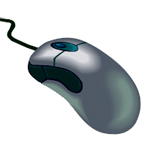 Case managers are advocates, leaders, influencers, problem-solvers, educators and more! In every work setting and within healthcare in general, there is a common challenge: how to best meet our clients’ needs in an industry that is continually evolving. Legislative and regulatory changes trickle down and lead to more change at the employer level. Initiatives to improve our practice, reinforce our value and protect our profession will ultimately lead to increased recognition that case management is the true healthcare reform.
We invite you to become a part of the conversation by participating in the 2018 Call for Presentations. Based on rigorous market research, proposals should fall under one or more of the following tracks. Proposals in these categories will be given priority in the selection process: Acute Care; Workers’ Compensation; Discipline-Specific Case Management; Long Term Care; Leadership; Population Health; Managed Care.
Consider your contribution and submit by September 21, 2017.
|

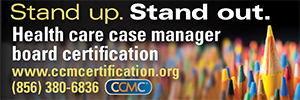

In case you didn't find time to complete your CEs or evaluations onsite in Austin, you can now access them right from your computer! Be sure to print or save the certificate so that you can access it later. Access to the online CE Manager will end on August 31st.
Are you ready for 2018? So are we! Registration for our 2018 conference in Chicago is open! In case you haven't heard yet, each paid registrant will receive a FREE
one year individual membership with CMSA! Follow the link below to learn more and register. We can't wait to see you there!
Learn More & Register
|
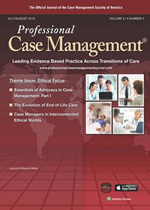 Professional Case Management is a
peer-reviewed, contemporary journal that crosses all case management settings.
The Journal features best practices, industry benchmarks and hands-on
information for both the professional case manager and those newer to the
specialty. Additionally, PCM provides continuing education opportunities
and cutting-edge research, as reflected in the tagline, Leading Evidence Based
Practice Across Transitions of Care. Professional Case Management is a
peer-reviewed, contemporary journal that crosses all case management settings.
The Journal features best practices, industry benchmarks and hands-on
information for both the professional case manager and those newer to the
specialty. Additionally, PCM provides continuing education opportunities
and cutting-edge research, as reflected in the tagline, Leading Evidence Based
Practice Across Transitions of Care.
Professional Case Management
Print Upgrade
All members
receive complimentary online access to Professional Case Management, the
official journal of CMSA, as a benefit of membership. A print subscription to Professional
Case Management is now available to all members for an additional $35.00
fee (per year). To add the print version to your subscription, please call
Lippincott Williams & Wilkins' Member Services at 1-866-489-0443 and
reference promotion code MGK296ZZ. Learn More
Discounted CEs from
Lippincott, Williams, and Wilkins
As part of
your CMSA member benefits, you have access to discounted continuing education
opportunities through our journal publishing partner, Lippincott Williams &
Wilkins. Content is based on peer-reviewed Lippincott journals, trusted by
nurses globally to provide current, evidence-based and authoritative content
critical to everyday practice. All CE activities in Professional Case
Management are discounted 25 percent.
This
includes CCMC, ANCC, NAHQ, and NASW contact hours. To access activities, take
these steps:
1. Go to http://nursing.ceconnection.com/default.
Log in using your NursingCenter.com user ID and password.
2. Visit http://nursing.ceconnection.com/browse/sources/28 and enter the offer code "CMSA" into the coupon field upon check out.
3. Complete check out and enjoy.
|
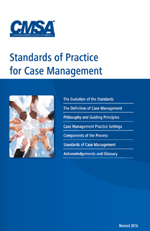
Download CMSA's Standards of Practice for Case Management, 2016 revision, which provides practice guidelines for the case management industry and its diverse stakeholders.The impetus for the 2016 revision of the Standards is the need to emphasize the professional nature of the practice and role of the case manager.
The 2016 Standards contain information about case management including an updated definition, practice settings, roles and responsibilities, case management process, philosophy and guiding principles, as well as the standards and how they are demonstrated.
Download Your Copy
|

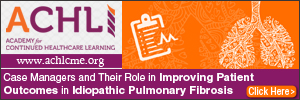
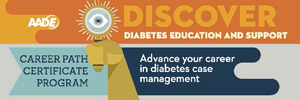
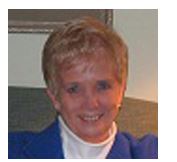 Pat Stricker, RN, M Ed
SVP, Clinical Services
TCS Healthcare Technologies
Hospital readmissions are associated with unfavorable patient outcomes and high financial costs. Prior to 2008, nearly 20 percent of all Medicare discharges had a readmission within 30 days, costing taxpayers $15 billion a year. It was estimated that 12 percent of readmissions were potentially avoidable. Preventing even 10 percent of those would save Medicare $1.5 billion annually. Consequently, reducing hospital readmissions was made a national priority.
In 2008, the Centers for Medicare & Medicaid Services (CMS) began confidentially reporting readmission rates and resource usage to hospitals and physicians. In 2009, they publicly reported the data on hospital readmission rates and added it to Hospital Compare website. This website provides consumers with a wealth of information about hospitals to help them make informed decisions by comparing all Medicare/Medicaid hospital performance measures (patient experiences, timely & effective care, complications, readmissions & death, use of medical imaging, and payment & value of care).
Before 2012, hospitals received payment using the inpatient prospective payment system (IPPS), which pays based on a diagnosis-related group (DRG). These cover the inpatient stay, as well as outpatient diagnostic and admission-related outpatient non-diagnostic services provided by the institution on the date of the patient’s admission or within three days immediately preceding the admission date. It does not include post-discharge care or interventions, so hospitals had no financial incentive to reduce the incidence of readmissions.
|

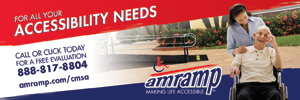
 Moving Patients From Acute Care to Rehabilitation Following Catastrophic Injury Moving Patients From Acute Care to Rehabilitation Following Catastrophic Injury
by Morgan Brubaker, DO, and Andrew Schaeffer, MSW, LCSW
A catastrophic injury, such as a spinal cord injury or traumatic brain injury, is something most people don’t think about or plan for until it happens. When it does happen, patients and their families are often in a state of devastation and shock; their lives have been completely altered in a matter of minutes, and they are often struggling just to understand what has happened to their loved one. They can become overwhelmed with the machines, the process and number of medical personnel involved, medical terminology, and often aren’t sure whom they should ask the seemingly infinite number of unanswered questions in their minds.
This state of devastation and confusion can make it difficult for families to focus on anything beyond the patient’s current health state and the moment-to-moment ups and downs after a catastrophic injury. However, long-term care planning should be a key consideration almost immediately when a patient is admitted into the ICU. Lengths of stay in acute care prior to transfer to rehabilitation average three weeks, so efficient and effective decision-making is important.
The ICU/acute care social worker, whose role is complex, dynamic and fast-paced, is tasked with assessing the patient’s condition, the family’s needs and providing essential support to all involved in the patient’s treatment. Serving as a liaison between the patient/family and the medical staff, medical social workers address several important factors in the early stages of a catastrophic injury, such as initial family support, crisis counseling, coordination with insurance companies and public benefit specialists, education on advance directives and care planning, surrogate decision makers and guardianships. Families under extreme stress also have difficulty sustaining attention and remembering information provided to them, so repetition and journal-keeping are encouraged.
|
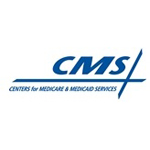 On August 16, as part of CMS's continuing commitment to greater data transparency, Centers for Medicare & Medicaid Services (CMS) unveiled the Hospice Compare website. The site displays information in a ready-to-use format and provides a snapshot of the quality of care each hospice facility offers to its patients. CMS is working diligently to make healthcare quality information more transparent and understandable for consumers to empower them to take ownership of their health. By ensuring patients have the information they need to understand their options, CMS is helping individuals make informed healthcare decisions for themselves and their families based on objective measures of quality.
"The Hospice Compare website is an important tool for the American people and will help empower them in a time of vulnerability as they look for information necessary to make important decisions about hospice care for loved ones," said CMS Administrator Seema Verma. "The CMS Hospice Compare website is a reliable resource for family members and care givers who are looking for facilities that will provide quality care."
Hospice facilities offer specialized care and support to individuals with a terminal illness and a prognosis of six months or less if the illness runs its normal course. Once a patient elects hospice care, the focus shifts from curative treatment to palliative care for relief of pain and symptom management, and care is generally provided where the patient lives. Additionally, caregivers can get support through the hospice benefit, such as grief and loss counseling. Hospice Compare helps patients and caregivers find hospice providers in their area and compare them on quality of care metrics.
Source: Centers for Medicare & Medicaid Services
|
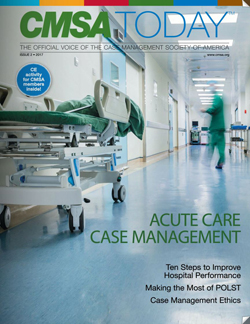 CMSA Today™—the official magazine of the Case Management Society of America—is the magazine for case managers. We are committed to providing case management knowledge, perspectives and news to case managers in all sectors of the profession. To facilitate that mission, we accept and consider: CMSA Today™—the official magazine of the Case Management Society of America—is the magazine for case managers. We are committed to providing case management knowledge, perspectives and news to case managers in all sectors of the profession. To facilitate that mission, we accept and consider:
- Original articles written by case managers of all healthcare backgrounds;
- Expertly prepared articles from professional writers—whether medical
writers or experienced generalists—on case management topics;
- Feature articles, column material, and news about case management
trends and issues, as well as about CMSA chapters and their activities;
- and personal, member-generated items considered nontraditional for a
professional-association publication as poems, remembrances and similar
sorts of content.
Consider sharing your knowledge by writing and submitting an article! Click below to learn more.
Learn More
|

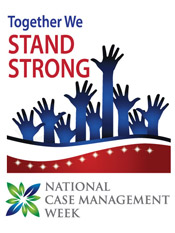 We have a few months before National Case Management Week arrives, but now is the perfect time to begin planning your celebrations! Activities during the week include banquets and recognition dinners, state and city proclamations, continuing education seminars, and other community events. Case managers are often honored with gifts, dinners, and flowers by friends and family members, coworkers such as doctors and administrators, and patients who want to show their appreciation.
We have history, communications and product resources available now; click on the link below to begin planning your week with your colleagues!
|
|
| |
|

